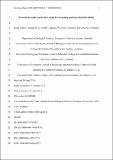Precocial juvenile lizards show adult level learning and behavioural flexibility
Abstract
In altricial species, young rely on parental care and brain maturation mainly occurs after birth. In precocial species, young are born at a more advanced developmental stage in need of less or no parental care and brain development is mostly completed at the time of birth. We therefore predicted early maturation of learning ability in precocial species. We used a series of visual discrimination and reversal stages to investigate the ability of the precocial eastern blue-tongue lizard, Tiliqua scincoides scincoides, a long-lived Australian lizard species with slow-developing young, to respond to changes in stimulus relevance and test for behavioural flexibility. To test whether age affects learning in this species, we compared juveniles (23–56 days) with adults (sexually mature, at least 2 years). In accordance with our expectations, adults and juveniles performed similarly well in all stages, suggesting that juveniles of this precocial species learn at adult levels from an early age. Both age classes performed well during reversals showing good behavioural flexibility. This is the first study in lizards to directly compare juvenile and adult behavioural flexibility. Importantly, we demonstrate that precocial lizards can begin life with an advanced cognitive ability already in place.In altricial species, young rely on parental care and brain maturation mainly occurs after birth. In precocial species, young are born at a more advanced developmental stage in need of less or no parental care and brain development is mostly completed at the time of birth. We therefore predicted early maturation of learning ability in precocial species. We used a series of visual discrimination and reversal stages to investigate the ability of the precocial eastern blue-tongue lizard, Tiliqua scincoides scincoides, a long-lived Australian lizard species with slow-developing young, to respond to changes in stimulus relevance and test for behavioural flexibility. To test whether age affects learning in this species, we compared juveniles (23–56 days) with adults (sexually mature, at least 2 years). In accordance with our expectations, adults and juveniles performed similarly well in all stages, suggesting that juveniles of this precocial species learn at adult levels from an early age. Both age classes performed well during reversals showing good behavioural flexibility. This is the first study in lizards to directly compare juvenile and adult behavioural flexibility. Importantly, we demonstrate that precocial lizards can begin life with an advanced cognitive ability already in place.In altricial species, young rely on parental care and brain maturation mainly occurs after birth. In precocial species, young are born at a more advanced developmental stage in need of less or no parental care and brain development is mostly completed at the time of birth. We therefore predicted early maturation of learning ability in precocial species. We used a series of visual discrimination and reversal stages to investigate the ability of the precocial eastern blue-tongue lizard, Tiliqua scincoides scincoides, a long-lived Australian lizard species with slow-developing young, to respond to changes in stimulus relevance and test for behavioural flexibility. To test whether age affects learning in this species, we compared juveniles (23–56 days) with adults (sexually mature, at least 2 years). In accordance with our expectations, adults and juveniles performed similarly well in all stages, suggesting that juveniles of this precocial species learn at adult levels from an early age. Both age classes performed well during reversals showing good behavioural flexibility. This is the first study in lizards to directly compare juvenile and adult behavioural flexibility. Importantly, we demonstrate that precocial lizards can begin life with an advanced cognitive ability already in place.In altricial species, young rely on parental care and brain maturation mainly occurs after birth. In precocial species, young are born at a more advanced developmental stage in need of less or no parental care and brain development is mostly completed at the time of birth. We therefore predicted early maturation of learning ability in precocial species. We used a series of visual discrimination and reversal stages to investigate the ability of the precocial eastern blue-tongue lizard, Tiliqua scincoides scincoides, a long-lived Australian lizard species with slow-developing young, to respond to changes in stimulus relevance and test for behavioural flexibility. To test whether age affects learning in this species, we compared juveniles (23–56 days) with adults (sexually mature, at least 2 years). In accordance with our expectations, adults and juveniles performed similarly well in all stages, suggesting that juveniles of this precocial species learn at adult levels from an early age. Both age classes performed well during reversals showing good behavioural flexibility. This is the first study in lizards to directly compare juvenile and adult behavioural flexibility. Importantly, we demonstrate that precocial lizards can begin life with an advanced cognitive ability already in place.
Citation
Szabo , B , Noble , D W A , Byrne , R W , Tait , D S & Whiting , M J 2019 , ' Precocial juvenile lizards show adult level learning and behavioural flexibility ' , Animal Behaviour , vol. 154 , pp. 75-84 . https://doi.org/10.1016/j.anbehav.2019.06.003
Publication
Animal Behaviour
Status
Peer reviewed
ISSN
0003-3472Type
Journal article
Description
This project was funded by an ARC Discovery grant (DP130102998) to M.J.W. and R.W.B. and by Macquarie University.Collections
Items in the St Andrews Research Repository are protected by copyright, with all rights reserved, unless otherwise indicated.

